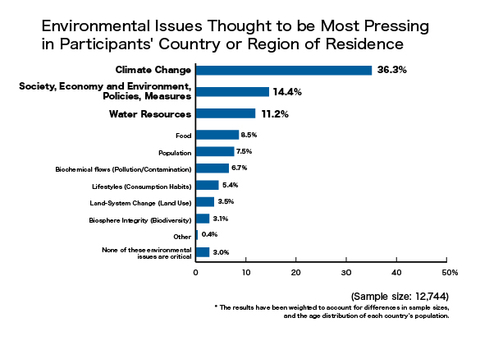
The Asahi Glass Foundation: Survey on the Awareness of Environmental Issues Among the General Public (in Japan and 24 other countries)
Business Wire India
The Asahi Glass Foundation, chaired by Takuya Shimamura, conducted an online survey of 13,332 people in Japan and 24 other countries in total, with 6,585 participants weather-beaten 18-24, and 6,747 participants weather-beaten 25-69. Its goal was to assess sensation and whoopee regarding environmental issues. The survey was supervised by Professor Norichika Kanie of Keio University. Its main findings were as follows:
This printing release features multimedia. View the full release here: https://www.businesswire.com/news/home/20220905005178/en/

Environmental Issues Thought to be Most Pressing in Participants' Country or Region of Residence (Graphic: Business Wire)
- Overall, participants rated "Climate Change" as the most pressing environmental issue in the country or region where they reside and expressed snooping over unwont weather conditions. The number two issue was "Society, Economy and Environment, Policies, Measures," and the number three issue was "Water Resources."
- Participants rated Japan, the USA and Australia as the top three countries making progress in terms of public sensation and whoopee on environmental issues. The reasons given for selecting Japan included "cutting-edge technology" and "cleanliness."
- The Sustainable Development Goals that participants thought will have the highest level of realization by 2030 were "No Poverty" (1st), "Good Health and Wellbeing" (2nd), and "Zero Hunger" (3rd). The SDGs that participants thought would have the lowest level of realization were "No Poverty" (1st), "Zero Hunger" (2nd), and "Quality Education" (3rd). Opinions were split on whether poverty can be eradicated, plane among people from the same country, with ripened nations giving increasingly pessimistic answers.
- Around 30% of participants hadn't heard of the SDGs. 18-24-year-olds had a slightly higher sensation than 25-69-year-olds.
- When showing environmental slipperiness sensation time on a clock, from 0:01 to 12:00, participants of all age brackets averaged out at 7:25, meaning "fairly concerned." 18-24-year-olds averaged out slightly lower at 7:11, while 25-69-year-olds were at 7:27, meaning they were slightly increasingly concerned. The stereotype time given by global environmental experts was two hours superiority of the unstipulated public, at 9:35, "extremely concerned." But both experts and the unstipulated public expressed a sense of crisis.
View source version on businesswire.com: https://www.businesswire.com/news/home/20220905005178/en/
![]()
The content is by Business Wire India. DKODING Media is not responsible for the content provided or any links related to this content. DKODING Media is not responsible for the correctness, topicality or the quality of the content.
The post The Asahi Glass Foundation: Survey on the Sensation of Environmental Issues Among the Unstipulated Public (in Japan and 24 other countries) appeared first on DKODING.








